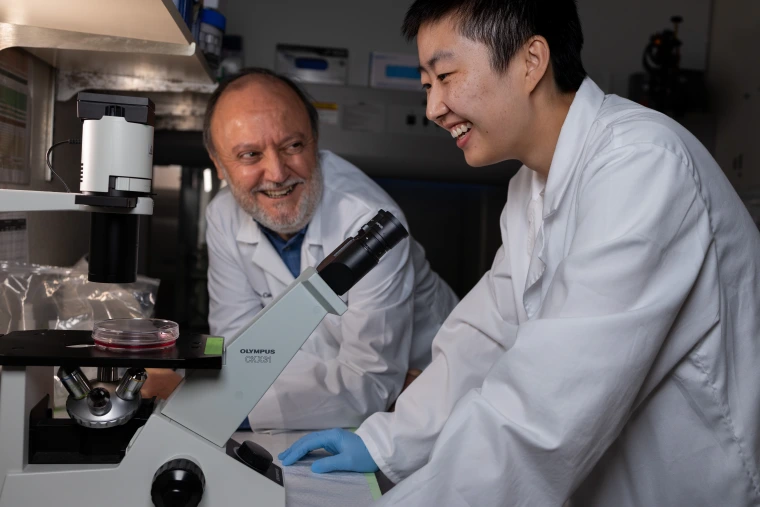T32 Integrative Cancer Scholars

From left, Professor Carlos Caulin laughs with student Manlin Shao in the Caulin Lab.
Manlin Shao
Mentors Carlos Caulin, PhD, and Steven Wang, MD
Manlin Shao said she became captivated by cancer research when she started to see its complexity and the various directions that can be pursued in prevention, therapy and personalized medicine. Shao’s project focuses on how a mutation in the tumor suppressor gene p53, affects the recruitment of tumor-associated white blood cells called macrophages.
These white blood cells kill microorganisms, remove dead cells, and contribute to the development and progression of oral squamous cell carcinoma–malignant tumors that grow in the mouth from squamous cells found in skin as well as respiratory and digestive tracts.
Oral squamous cell carcinoma ranks as the sixth most common cancer globally and is closely linked to poor prognosis and chemotherapy resistance.
“Given the potential impact of research on patient outcomes, I believe that developing cancer treatments is profoundly significant and impactful—not only for OSCC but for all types of cancer,” Shao said.
Shao is enrolled in the MD/PhD physician scientist program at the U of A COM-T and chose to work with Carlos Caulin, PhD, because he aligns with her research interests. Caulin is a member of the cancer center’s Cancer Biology Program and an associate professor in the U of A College of Medicine – Tucson, Department of Otolaryngology.
“Overall, the supportive and collaborative environment at the U of A is an ideal setting for my academic and professional growth,” Shao said.
Through her educational journey, Shao has greatly benefited from her mentors across a variety of fields in basic science research, clinical research, and academia.
“Mentorship for me goes beyond seeking help. It involves learning from their daily behaviors, absorbing their work ethics, and aspiring to their thought processes,” she said.
Caulin thinks the Integrative Cancer Scholars program is unique due to its emphasis on promoting translational cancer research for clinical applications.
“This approach encourages graduate students to explore fundamental cancer research questions that may lead to discoveries that could benefit cancer patients,” he said. “As these students develop as scientists, their curiosity about cancer biology will drive them to uncover processes that may lead to new therapeutic opportunities.”
He thinks the program fosters a community of graduate students who share this vision, promoting collaborations and helping them build long-lasting professional relationships.
“Graduate students are the future of research in both academic and industry settings,” Caulin said. “They’ll be leaders in their fields, driving research progress in the future.”



